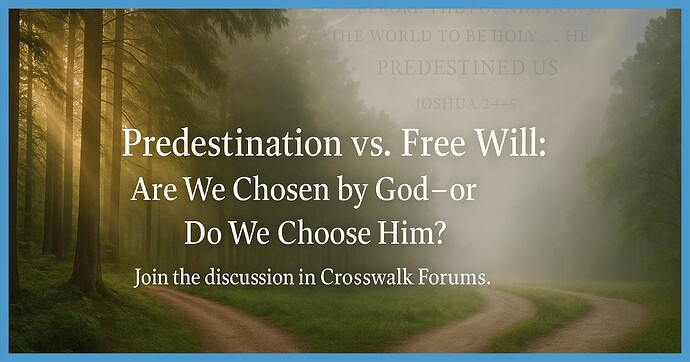As Christians reflect on salvation, sovereignty, and the role of human choice, we invite your voice in Crosswalk Forums.
#Predestination #FreeWill #christianforums #crosswalkforums #forums #crosswalk #faithcommunity #faithforums
This is one of the issues that I have been fighting for long.
@SincereSeeker @KPuff @Johann @TheologyNerd @Bruce_Leiter @Dr_S @Bruce_leiter, @Soul and others are welcome to help me with this problem
Throughout the centuries, Christians have wrestled with a deeply thought-provoking and often divisive question: Are we saved because God chose us before time began, or because we, of our own free will, chose to follow Him? This discussion lies at the heart of the doctrines of predestination and free will, both of which have significant implications for how we view salvation, grace, justice, evangelism, and the character of God.
On one hand, many Christians point to verses such as Ephesians 1:4–5 and Romans 8:29–30, which suggest that God, in His sovereign will, predestined some for salvation. This view is often associated with Calvinism, which teaches that God’s grace is irresistible and that those whom He elects will inevitably come to faith. In this perspective, salvation is entirely God’s work from start to finish, and human choice plays no decisive role.
On the other hand, other believers emphasize human responsibility and the ability to choose or reject God’s grace. Passages such as Joshua 24:15 (“Choose for yourselves this day whom you will serve”) and Revelation 3:20 (“I stand at the door and knock…”) seem to imply that people are free to respond to God’s call. Arminianism and other synergistic views uphold that while God’s grace initiates salvation, humans must cooperate with it through free will.
This leads us to pressing theological questions:
- If God predestines some and not others, is that fair or just?
- If human beings are completely free, does that undermine God’s sovereignty?
- Can both predestination and free will be true in some mysterious way known only to God?
- How does this debate affect the way we evangelize or understand spiritual growth?
The issue becomes even more complex when we consider ideas like Molinism (God’s knowledge of all possible decisions), or the Orthodox and Catholic concept of synergy, where divine grace and human freedom work together in the process of salvation.
The main question is:
What are your thoughts on this matter? Do you lean more toward divine predestination or human free will?
Can both ideas coexist in a consistent theology?
How do you reconcile the tension between God’s sovereignty and man’s responsibility?
Your answer will be of utmost importance to me, and will be precious as it can help me with this topic.
